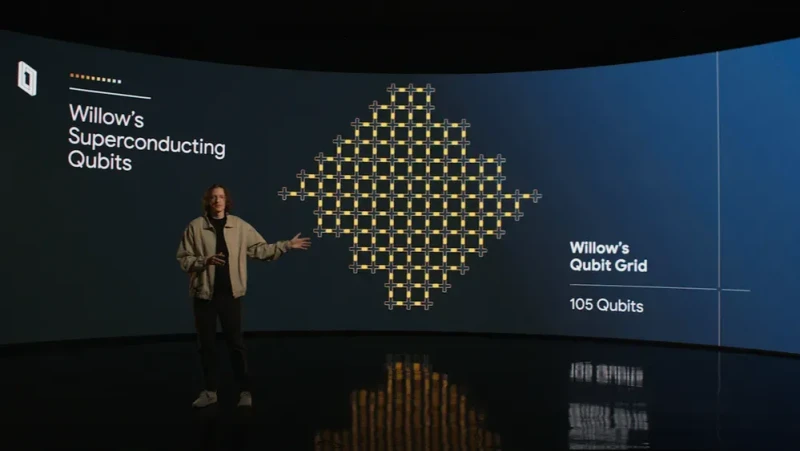What If AI Had the Power of Google's Willow Chip?
Imagine a world where artificial intelligence (AI) operates with the unprecedented power of Google's quantum computing chip, Willow. This 105-qubit marvel can perform calculations in minutes that would take traditional supercomputers billions of years. The combination of AI and quantum computing could redefine our future, touching every aspect of life.

Currently, AI relies on classical computing, impressive yet limited by conventional processors. Quantum computing, utilizing principles of quantum mechanics, performs computations at a speed and scale previously unimaginable. Merging AI with Willow’s quantum capabilities could revolutionize the field in profound ways:
AI systems could learn and adapt in real-time, processing vast datasets with unparalleled speed. This enhanced learning capability would allow AI to instantly respond to new information and environments. Problems once considered unsolvable could fall within reach, from optimizing complex systems to simulating molecular structures for drug discovery or creating highly accurate climate models. The exponential reduction in errors made possible by Willow would yield reliable, efficient AI systems, driving breakthroughs in cryptography, cybersecurity, and financial modeling.
This quantum-powered future raises significant ethical and practical considerations. Such immense power could be a double-edged sword, requiring robust safeguards to ensure responsible use and prevent misuse. Accessibility is another concern, as quantum computing remains expensive and limited to a few organizations. Efforts must be made to democratize its benefits, ensuring that progress is equitable. Additionally, quantum AI could amplify human ingenuity, fostering collaboration rather than competition between humans and machines, leading to unprecedented innovation.
To grasp the potential impact, consider these possibilities:
The fusion of AI and quantum computing, exemplified by Google’s Willow chip, represents an extraordinary leap in technological capability. Yet with such power comes great responsibility. Navigating this new era requires careful consideration of ethical, social, and practical implications to ensure the technology serves humanity equitably and responsibly. How we manage this transition will shape the course of our future.

Currently, AI relies on classical computing, impressive yet limited by conventional processors. Quantum computing, utilizing principles of quantum mechanics, performs computations at a speed and scale previously unimaginable. Merging AI with Willow’s quantum capabilities could revolutionize the field in profound ways:
AI systems could learn and adapt in real-time, processing vast datasets with unparalleled speed. This enhanced learning capability would allow AI to instantly respond to new information and environments. Problems once considered unsolvable could fall within reach, from optimizing complex systems to simulating molecular structures for drug discovery or creating highly accurate climate models. The exponential reduction in errors made possible by Willow would yield reliable, efficient AI systems, driving breakthroughs in cryptography, cybersecurity, and financial modeling.
This quantum-powered future raises significant ethical and practical considerations. Such immense power could be a double-edged sword, requiring robust safeguards to ensure responsible use and prevent misuse. Accessibility is another concern, as quantum computing remains expensive and limited to a few organizations. Efforts must be made to democratize its benefits, ensuring that progress is equitable. Additionally, quantum AI could amplify human ingenuity, fostering collaboration rather than competition between humans and machines, leading to unprecedented innovation.
To grasp the potential impact, consider these possibilities:
- Data Processing: Current AI can analyze datasets with millions of data points. Quantum AI could handle datasets with billions or even trillions of points, providing insights previously out of reach.
- Drug Discovery: While it typically takes 10–15 years to develop a new drug, quantum AI could cut this to a few years by rapidly simulating and testing molecular structures.
- Climate Modeling: Quantum AI could improve the accuracy of climate simulations, enabling effective strategies for addressing global environmental challenges.
The fusion of AI and quantum computing, exemplified by Google’s Willow chip, represents an extraordinary leap in technological capability. Yet with such power comes great responsibility. Navigating this new era requires careful consideration of ethical, social, and practical implications to ensure the technology serves humanity equitably and responsibly. How we manage this transition will shape the course of our future.
Read next
Everything You Need to Know About Steam Replay 2024
Your Steam Replay 2024 is now available - check out how many games you played this year, when you pl...
Driving the Future: Honda and Nissan in Talks for a Groundbreaking Merger
Japanese car manufacturers Honda and Nissan are reportedly in talks to deepen their partnership, wit...
Xmail: Elon Musk’s Bold Plan to Revolutionize Email Forever
Elon Musk's Xmail aims to revolutionize email by prioritizing privacy, innovation, and seamless inte...
Why Sora Struggles with Capturing Fast-Moving People in Videos
Sora struggles with capturing fast-moving people in videos due to challenges in understanding comple...









 Continue with Google
Continue with Google